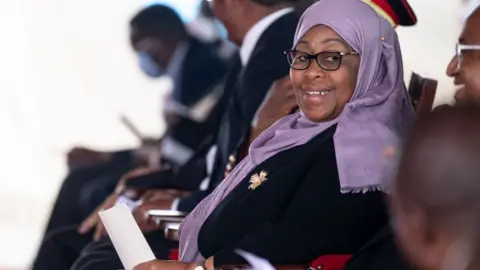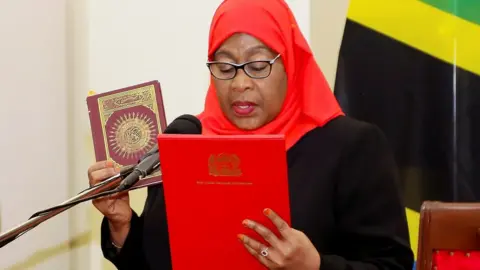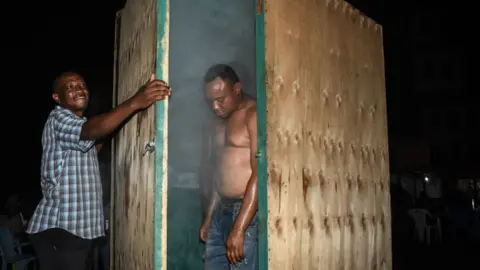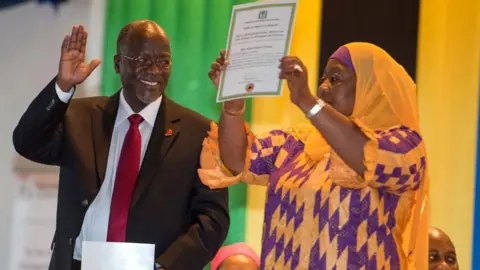Samia Suluhu Hassan - Tanzania's new president challenges Covid denial
 Getty Images
Getty ImagesHer predecessor was known for his rhetorical outbursts, whereas Tanzania's new president is calm.
Where he was contentious, President Samia Suluhu Hassan is more conciliatory.
Where he was autocratic, she appears to be more inclusive.
It is less than two months since the death of the former President, John Magufuli, aged 61 but his vice-president, who was sworn in as head of state soon after he died, looks to be on a different path.
Whether it is President Samia's approach to coronavirus, media freedom or dealing with the opposition she has set a new tone, with her comments often being delivered in a calm and authoritative manner.
 Reuters
ReutersNevertheless, the president appears uncomfortable when comparisons are made and has told off Tanzanian legislators for contrasting her with Magufuli.
"Magufuli and Samia, are essentially the same person. I have been following the debate, and I must say it is unhealthy for our nation," she told MPs a month after she was sworn in.
But "it is almost impossible not to make comparisons", according to journalist and political commentator Jesse Kwayu, noting that there is a big contrast.
"She is… prudent and comes on board with a lot of rigour and attention to detail. She… understands the proper channels of communication and correction."
The very first time she stood on stage as president, her aura, choice of words and demeanour promised a completely different type of leadership. It was one that Tanzania had not experienced since Magufuli, nicknamed "the bulldozer" for his no-nonsense approach, came to power in 2015.
"Where others would have stammered, she is making bold announcements," Deodatus Balile, managing editor of Jamhuri Media Limited, says, describing her as diplomatic.
"She realises that Tanzanians cannot live in isolation, and we have to be part of a system, and look at some issues as part of a global entity."
Perhaps the sharpest contrast is in her approach to Covid-19.
Vaccines and lockdowns?
Magufuli scoffed at the global warnings over coronavirus and downplayed its threat, refusing to allow Covid-19 vaccines into the country. At one point he announced that the virus had been defeated by prayer in Tanzania.
 AFP
AFPThere are no reliable statistics on infection or deaths from the virus in Tanzania as Magufuli's government stopped releasing them in May last year.
President Samia, on the other hand, acknowledges that Tanzania can no longer wish the virus away.
Within three weeks of being in power, she formed a committee of experts to advise her on the status of Covid-19 in the country and the necessary steps to take to keep people safe.
She has even been seen wearing a face mask, something that Magufuli never did, although it was on a visit to Uganda, and not in Tanzania itself.
Whether her pronouncements are making a major difference to the perceptions around Covid-19 and resetting the clock is yet to be seen. It is also true to say that no new policies have emerged from the expert committee.
With new variants of the disease being reported across the globe, many are keen to know her attitude to vaccinations. People are also waiting to find out if she would consider lockdowns and curfews as ways to contain the virus, which her predecessor rejected.
Such measures would affect millions of poorer Tanzanians including informal traders who are the support base of the ruling party - Chama Cha Mapinduzi.
If she was going to go down that path then President Samia would need to bring out her qualities of persuasion in arguing that restrictive measures were in their interests.
But she has these qualities, according to Mr Kwayu.
 AFP
AFPPresident Samia first came to national attention in 2014 when she was elected as the vice-chairperson of the Constitutional Assembly mandated with drafting a new constitution.
She emerged as "a very mature leader, composed and having the capability to balance opposing voices and opinions", the political commentator says.
That willingness to hear different opinions has led to a new attitude to the media.
Magufuli's government was responsible for shutting down media outlets and was accused of harassing and imprisoning journalists. Some politicians and activists who publicly opposed Magufuli were also detained.
But President Samia has been seen to be reopening public debate.
Olive branch
She ordered the information ministry to reverse previous decisions saying the government should "not give [people] a chance to say that we are limiting press freedom".
The president has also reached out to the opposition with the aim of discussing "how best they will conduct their political activities for the benefit of our country".
She already had the reputation of holding out an olive branch following a visit to opposition leader Tundu Lissu in hospital in 2017 after he was shot several times by gunmen in an assassination attempt. She was the only government official to do so.

You may also be interested in:

It is also expected that President Samia will take a less aggressive stance than Magufuli towards international companies in the country.
In 2017, Acacia Mining, a subsidiary of Canadian parent company Barrick Gold, was slapped with an incredible $190bn (£145bn) tax bill over royalties the government said it owed, though it denied any wrongdoing. Barrick managed to reduce the bill as part of a settlement with the government, which included sharing future economic benefits more equitably.
Magufuli also restricted regional businesses from accessing the Tanzanian market, and tightened restrictions on unprocessed goods coming in from countries like Kenya.
"Her tone so far is about promoting investments and driving trade, and broadening the tax base," Sanjay Rughani, who heads a CEO forum, says.
"As for the private sector, we are eager to see her include us more in government's processes that seek to build Tanzania."
President Samia is due on Tuesday to make her second international trip, this time to Kenya, in her seven weeks in power. Comparing this to Magufuli's 10 official trips abroad in his six years in office, Mr Kwayu is confident that the new president will be more outward facing.
"I am certain Tanzania is going to be put back on the global map," he says. "It will take part in regional engagements like conflict resolution, and it will be well represented in places like the United Nations General Assembly."
For him, President Samia's different approach to leading the country is not about tarnishing her predecessor's reputation but rather about "choosing democracy… and doing away with" what was stifling it.
She still has to tread a path linking the previous government - which after all she was part of - and a new style of management which is more accepting of a diverse range of opinions.

Africa's previous female heads of state:
 Reuters
Reuters1993-4 - Sylvie Kinigi - caretaker President of Burundi, following the killing of Melchior Ndadaye
1996-7 - Ruth Perry - chair of Council of State after Liberia's first civil war
2006-18 - Ellen Johnson Sirleaf - elected President of Liberia
2009 - Rose Francine Rogombé - Interim President of Gabon following the death of Omar Bongo
2012 - Monique Ohsan-Bellepeau - Acting President of Mauritius, after the resignation of Sir Anerood Jugnauth
2012-14 - Joyce Banda - President of Malawi, after the death of Bingu wa Mutharika
2014-16 - Catherine Samba-Panza - transitional President of Central African Republic, elected by parliament
2015-18 - Ameenah Gurib-Fakim - President of Mauritius, elected by parliament
2018-present - Sahle-Work Zewde - President of Ethiopia, elected by parliament
